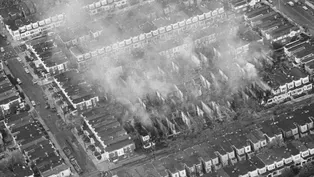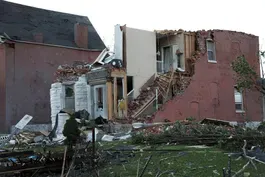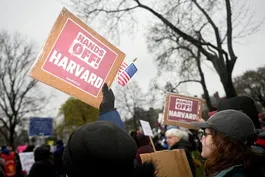
Why Israel is mobilizing a new ground assault on Gaza
Clip: 5/17/2025 | 4m 42sVideo has Closed Captions
Israel mobilizes new ground assault on Gaza to pressure Hamas into freeing hostages
Israel is mobilizing forces for a new ground assault in Gaza, after Palestinian officials said about 300 people died in waves of airstrikes over the past 72 hours. Israeli officials say the objective is to pressure Hamas into freeing the remaining hostages held in Gaza. Meanwhile, ceasefire talks resumed Saturday in Qatar. John Yang speaks with The Washington Post’s Gerry Shih for more.
Problems playing video? | Closed Captioning Feedback
Problems playing video? | Closed Captioning Feedback
Major corporate funding for the PBS News Hour is provided by BDO, BNSF, Consumer Cellular, American Cruise Lines, and Raymond James. Funding for the PBS NewsHour Weekend is provided by...

Why Israel is mobilizing a new ground assault on Gaza
Clip: 5/17/2025 | 4m 42sVideo has Closed Captions
Israel is mobilizing forces for a new ground assault in Gaza, after Palestinian officials said about 300 people died in waves of airstrikes over the past 72 hours. Israeli officials say the objective is to pressure Hamas into freeing the remaining hostages held in Gaza. Meanwhile, ceasefire talks resumed Saturday in Qatar. John Yang speaks with The Washington Post’s Gerry Shih for more.
Problems playing video? | Closed Captioning Feedback
How to Watch PBS News Hour
PBS News Hour is available to stream on pbs.org and the free PBS App, available on iPhone, Apple TV, Android TV, Android smartphones, Amazon Fire TV, Amazon Fire Tablet, Roku, Samsung Smart TV, and Vizio.
Providing Support for PBS.org
Learn Moreabout PBS online sponsorshipJOHN YANG: Good evening.
I'm John Yang.
The Israeli military says it's mobilizing forces for a new ground assault in Gaza after Palestinian officials said about 300 people died in waves of airstrikes over the past 72 hours.
Officials say the objective of the new offensive, dubbed Operation Gideon's Chariots, is to pressure Hamas into freeing the remaining hostages held in Gaza.
Even with the mounting fighting and preparations for more cease fire talks resume today in Qatar.
Jerry Shih is the Washington Post Jerusalem bureau chief.
Jerry, this operation was approved earlier this month by the Israeli Cabinet.
Any sense of why the delay or the distance between the approval and then launching it?
JERRY SHIH, Washington Post: Yeah, John, so basically what we've seen is that Israeli Prime Minister Benjamin Netanyahu said from the very beginning when this vote passed on May 4th that he was willing to send a massive military campaign into Gaza.
This is a ground assault that would probably encompass about five divisions, that's 60,000 troops.
And they would go in and they would take gradually increasing amount of area within Gaza and drive hundreds of thousands of Gazans south.
If Hamas were not to release hostages.
Now, that was May 4th.
We've had a couple of weeks passed since then, and essentially what we saw was this threat of this campaign being used as a pressure tactic to force Hamas to come to the table from the Israeli perspective.
Now, just in the last couple of hours today on Saturday, we saw that the two sides were again meeting in Doha in what appeared to be a last ditch effort to see if they could reach a deal that would see about 10 Israeli hostages or a little bit fewer than that release in exchange for a ceasefire of one month or more.
JOHN YANG: And so the military is sort of watching the negotiations, the cease fire negotiations, any sense of how it's going, the ceasefire negotiations?
JERRY SHIH: Well, what I can tell you is that, you know, before President Trump arrived in the Middle East early this week, there was actually quite a bit of optimism that maybe a deal could be struck simply because President Trump, as we all know, is very unpredictable.
He may sort of issue some sort of statement that would pressure Prime Minister Netanyahu to come to the table.
And we saw that Hamas also released as a, quote, unquote, goodwill gesture, an Israeli American dual citizen, Edan Alexander.
What we heard was that essentially as of Thursday and Friday, the talks were completely deadlocked.
Now, we're seeing kind of one last push.
Today, the defense minister, Israel Katz, said that it was precisely because of the threat of this impending massive military operation that forced Hamas to come back to the table earlier today on Saturday.
So we're waiting to see how that goes.
But there's a very high possibility, I would say, that we could see a major escalation in the coming 24 or 48 hours.
JOHN YANG: The Israeli military says the bombing that's been going on in Gaza for the past few days has been in preparation for this offensive.
Here's a mother who was in a tented camp in central Gaza that was hit.
UM FIRAS AL-MANSI (through translator): There is no food or drink.
I am psychologically unwell.
What should we do?
Where can we get food?
Where will the children eat or drink?
The tent was hit.
Even if there were leftover rice, macaroni or anything, it is all gone.
JOHN YANG: Now with the strike, the Israeli cabinet has also agreed to the framework of a plan to have foreign companies deliver aid to Gaza.
Any idea what that's going to look like?
JERRY SHIH: Yeah, John, So that's precisely a very important point to keep in mind, which is that aside from the threat of this imminent military campaign and what has already been an extremely bloody week in Gaza, that I've seen more than 300 people killed in Israeli airstrikes, we're also facing this very quickly deteriorating humanitarian situation.
Now, on March 2, the Israeli government began to enforce essentially a full spectrum blockade of all food, fuel, medical supplies, everything going into the Gaza Strip, because the Israeli government claims that a lot of the aid shipments going in have been diverted by Hamas.
Now, it's been more than 70 days that have passed without a single ounce of food entering the Gaza Strip.
The UN has warned of a very imminent famine setting in within the Strip.
And something needs to happen soon.
JOHN YANG: Jerry Shih of the Washington Post from Jerusalem, thank you very much.
JERRY SHIH: Thank you, John.
The largely forgotten history of Philadelphia’s MOVE bombing
Video has Closed Captions
Clip: 5/17/2025 | 6m 40s | The largely forgotten history of Philadelphia’s police bombing of Black organization MOVE (6m 40s)
News Wrap: Deadly storms rip through Kentucky and Missouri
Video has Closed Captions
Clip: 5/17/2025 | 3m | News Wrap: Deadly storms rip through Kentucky and Missouri (3m)
Tracing one Hmong family’s journey from Laos to Rhode Island
Video has Closed Captions
Clip: 5/17/2025 | 4m 33s | Tracing one Hmong family’s journey from Laos to Rhode Island (4m 33s)
Trump’s escalating feud with Harvard affects cancer research
Video has Closed Captions
Clip: 5/17/2025 | 4m 39s | Trump administration’s escalating feud with Harvard affects breast cancer research (4m 39s)
Providing Support for PBS.org
Learn Moreabout PBS online sponsorshipSupport for PBS provided by:
Major corporate funding for the PBS News Hour is provided by BDO, BNSF, Consumer Cellular, American Cruise Lines, and Raymond James. Funding for the PBS NewsHour Weekend is provided by...















